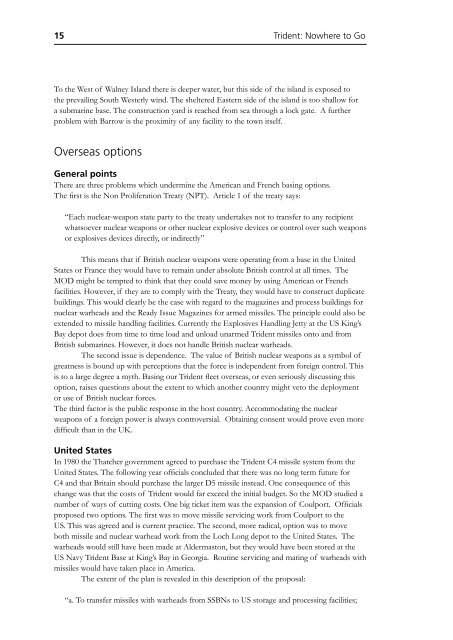Trident-NowhereToGo
Trident-NowhereToGo
Trident-NowhereToGo
You also want an ePaper? Increase the reach of your titles
YUMPU automatically turns print PDFs into web optimized ePapers that Google loves.
15<strong>Trident</strong>: Nowhere to GoTo the West of Walney Island there is deeper water, but this side of the island is exposed tothe prevailing South Westerly wind. The sheltered Eastern side of the island is too shallow fora submarine base. The construction yard is reached from sea through a lock gate. A furtherproblem with Barrow is the proximity of any facility to the town itself.Overseas optionsGeneral pointsThere are three problems which undermine the American and French basing options.The first is the Non Proliferation Treaty (NPT). Article 1 of the treaty says:“Each nuclear-weapon state party to the treaty undertakes not to transfer to any recipientwhatsoever nuclear weapons or other nuclear explosive devices or control over such weaponsor explosives devices directly, or indirectly”This means that if British nuclear weapons were operating from a base in the UnitedStates or France they would have to remain under absolute British control at all times. TheMOD might be tempted to think that they could save money by using American or Frenchfacilities. However, if they are to comply with the Treaty, they would have to construct duplicatebuildings. This would clearly be the case with regard to the magazines and process buildings fornuclear warheads and the Ready Issue Magazines for armed missiles. The principle could also beextended to missile handling facilities. Currently the Explosives Handling Jetty at the US King’sBay depot does from time to time load and unload unarmed <strong>Trident</strong> missiles onto and fromBritish submarines. However, it does not handle British nuclear warheads.The second issue is dependence. The value of British nuclear weapons as a symbol ofgreatness is bound up with perceptions that the force is independent from foreign control. Thisis to a large degree a myth. Basing our <strong>Trident</strong> fleet overseas, or even seriously discussing thisoption, raises questions about the extent to which another country might veto the deploymentor use of British nuclear forces.The third factor is the public response in the host country. Accommodating the nuclearweapons of a foreign power is always controversial. Obtaining consent would prove even moredifficult than in the UK.United StatesIn 1980 the Thatcher government agreed to purchase the <strong>Trident</strong> C4 missile system from theUnited States. The following year officials concluded that there was no long term future forC4 and that Britain should purchase the larger D5 missile instead. One consequence of thischange was that the costs of <strong>Trident</strong> would far exceed the initial budget. So the MOD studied anumber of ways of cutting costs. One big ticket item was the expansion of Coulport. Officialsproposed two options. The first was to move missile servicing work from Coulport to theUS. This was agreed and is current practice. The second, more radical, option was to moveboth missile and nuclear warhead work from the Loch Long depot to the United States. Thewarheads would still have been made at Aldermaston, but they would have been stored at theUS Navy <strong>Trident</strong> Base at King’s Bay in Georgia. Routine servicing and mating of warheads withmissiles would have taken place in America.The extent of the plan is revealed in this description of the proposal:“a. To transfer missiles with warheads from SSBNs to US storage and processing facilities;


